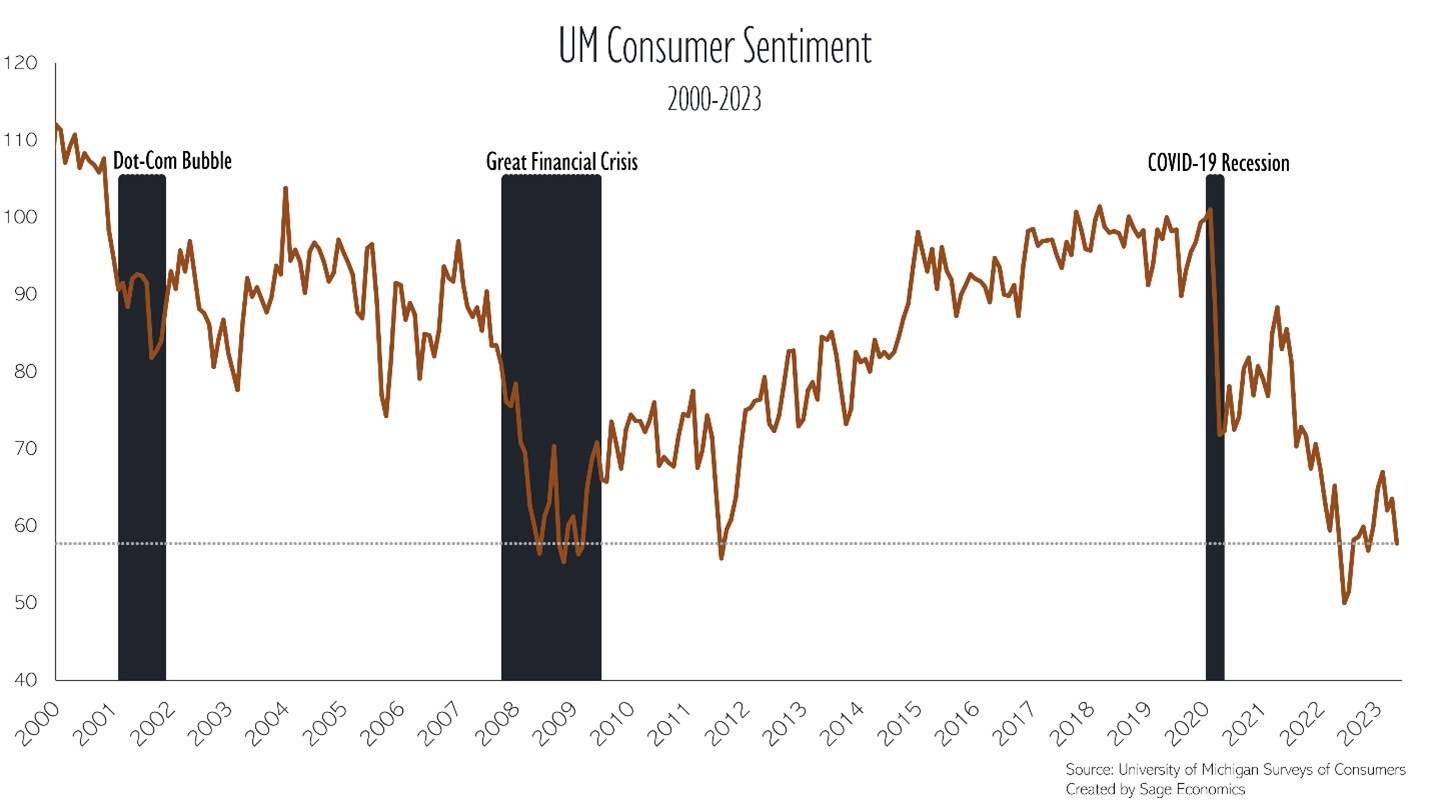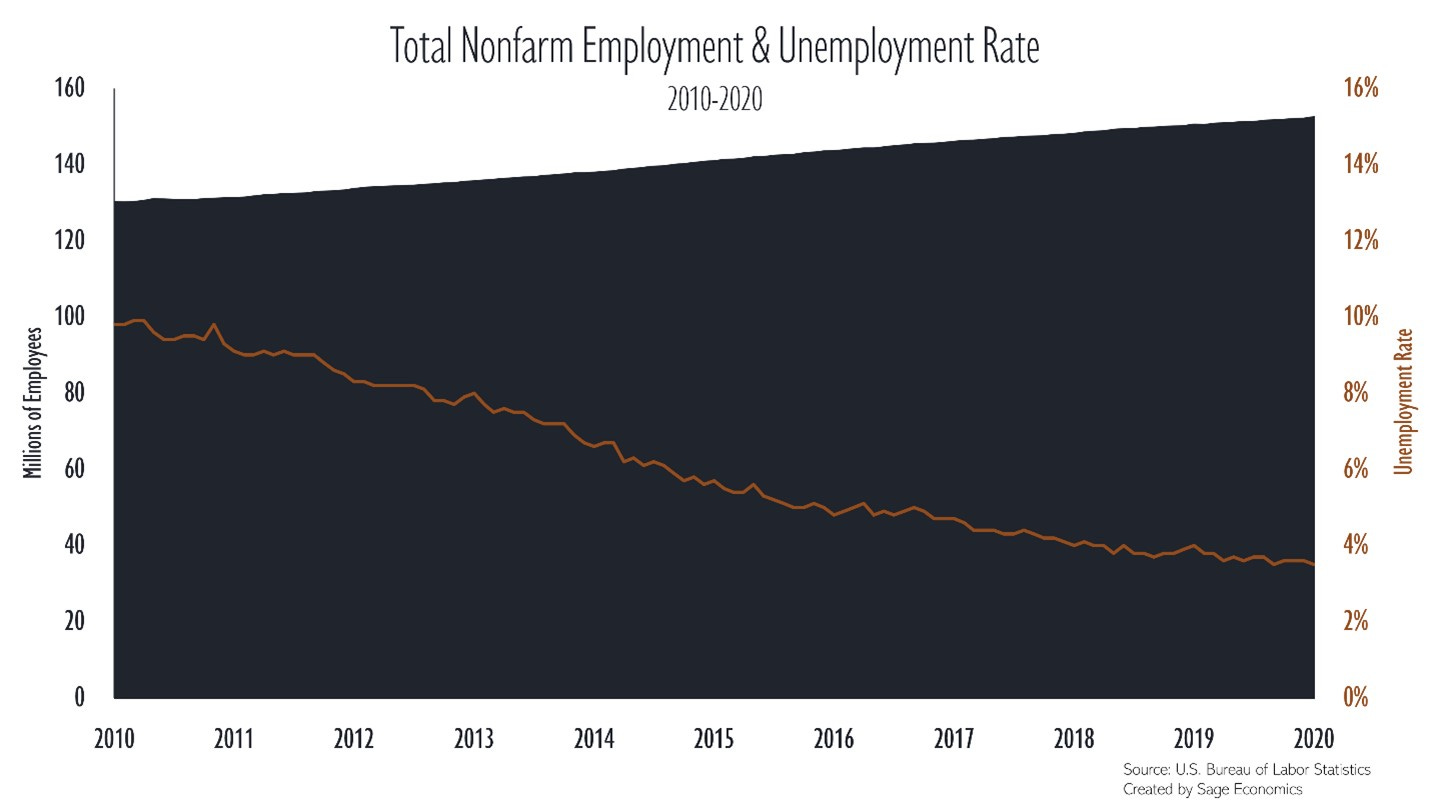My Feelings about Consumers' Feelings
The disconnect between consumer sentiment and economic reality
The sky is always falling. To hear Americans tell it, the end of the Republic is always just around the corner. If it’s not the debt ceiling, it’s something else. To date, we’ve been lucky enough to have Tom Brady and Lebron James to distract us. Now what?
Maybe we’ve become too whiny. Sure, inflation hurts, and for some reason check out kiosks ask you to tip on everything now. And yes, many forecasters, me included, predict recession at some point over the next 12 months. But the employment market is currently stronger than at any point in our lives and, at least for now, the economy continues to expand.
Despite that, Americans are doing their best imitation of Chicken Little. Consumer Sentiment is currently 18.3% worse than it was in September 2009, a horrific month for the economy amidst a raging global financial crisis. The unemployment rate had risen to 10.0%, the highest level in 27 years, and the economy had lost a combined 8.16 million jobs during a period of 20 consecutive months of job losses.
Compare that miserable period to today. The nation’s unemployment rate is at the lowest level since 1969 (3.4%). The economy has added jobs for 28 consecutive months. The average monthly gain during that streak is an incredible 471,000 new positions. Hello Roaring Twenties! Can anyone say Gatsby?
The Federal Reserve conducts a survey regarding the Economic Well-Being of U.S. Households. As of October 2022, 73% of Americans said they’re doing at least okay financially. That’s down from 78% in 2021, but that still represents one of the highest levels of financial wellbeing during the survey’s 10-year history.
The fact that 27% of Americans said they weren’t doing okay financially in 2022 is not something that should be taken lightly, but that figure stood at 30% in 2016 when consumer sentiment was much higher. It has declined about 36% since.
This post isn’t really about how people assess their own financial situation. It’s about the disconnect between people’s perception of their own situation and that of the broader economy. Right now, only one in five people think the national economy is good (or better). That’s down from half of respondents in 2019.
Put another way, the gap between the share of people saying their own financial situation is okay or better and the national economy is good or better has widened by 30 percentage points since 2019. What the American people seem to be saying is: “I’m fine, but sadly, you’re not.”
Undoubtedly, the current bout of enduring inflation plays a part, but it’s not clear how. People seem to be saying, “I’m thankful that I can deal with these higher prices. I’m so sorry others can’t.”
Politics appear to play a decisive factor in shaping these data, which are intended to tell us about economic conditions. While the economy has been associated with robust retail sales and job growth, our political situation is simply awful.
Everyone is always upset about something, whether it’s the Nebraska legislature, an election in Chicago, an indictment in New York City, or something someone said about something someone did at Disney. The 24/7 news cycle and social media are burning us out. I miss getting my news once a day. Even then, I skipped right to the comics (but not necessarily Dilbert – I’m trying hard not to offend here).
Culture wars shouldn’t shape our perception of economic performance. But clearly, there is a spillover in sentiment, and while our economy is not as bad as it was in ’09, we feel as bad as (or worse than) we did in ’09.
And then there’s partisanship. Look at the graph below. Did something happen in 2020? Oh, yeah, a global pandemic. But the pandemic seems to have had less impact on consumer expectations than the presidential election (I circled November 2020, though I probably didn’t need to). Apparently Democrats were becoming more prosperous even before the election, while Republicans were being impoverished.
This abrupt shift in consumer expectations occurs regardless of party; from October 2016 to February 2017, Republicans’ economic expectations increased 97% while Democrats’ fell by 42%. As you can see below, presidential elections generally don’t have that kind of impact on the economic trajectory.
We also have this banking thing going on. Silvergate, Silicon Valley, Signature, and even some banks that don’t begin with “S” (First Republic) have gotten into trouble. But I suspect that many Americans would simply say, “My bank is fine, too bad yours isn’t.” What’s more, consumer sentiment was already depressed before the recent spate of bank failures.
Another depressing aspect of life is the existence of economists. We’re not a happy lot. Many of us lacked girlfriends or boyfriends or even just friends in high school. We’re known as members of the dismal science for a reason, and we always seem to be looking forward to the next downturn. Many of us are gleefully predicting recession right now. That may have dampened consumer sentiment as well.
From my perspective, this disconnect is unfortunate. Consumer sentiment used to be useful a leading economic indicator, but now it seems like little more than a reflection of an endlessly active news cycle.
What’s Next
Week in Review on Friday (and every other Friday too). That’s just for paying subscribers. We’ll have more content for all subscribers soon, including a post about the monthly BLS jobs report on 6/2 and a Monday Morning Optimism post on 6/5.







Excellent writing!
Well stated!
The Q2 2023 FMI Construction Industry Round Table's Sentiment Index report came out last week. 50% of survey respondents believe the U.S. economy will worsen in the next quarter. BUT in their own regions, nearly 70% think their economies will improve or stay the same.
77%(!!) predict their backlogs will improve(51%) or remain unchanged(26%)in the next quarter. Only 23% predict their backlogs will be "moderately lower". Yet a big chunk(one-third of that 77%) predict the economy will worsen. Go figure!
Might as well have included a quote from one of them saying, "Oh, things are great where I live, but the rest of the country is going to hell."